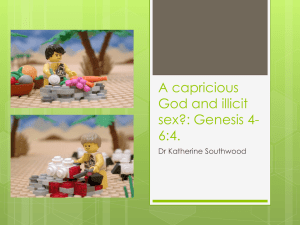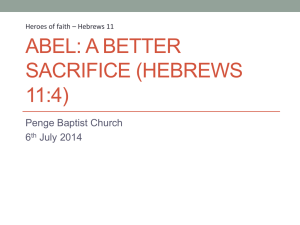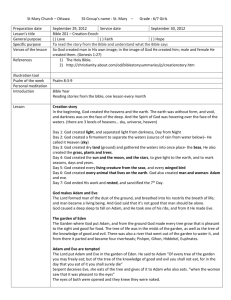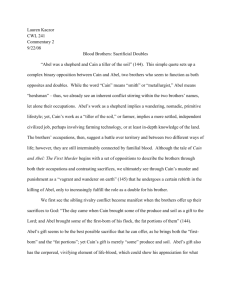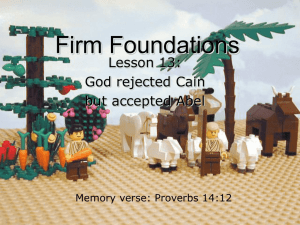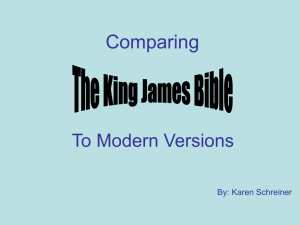Capital Punishment
advertisement
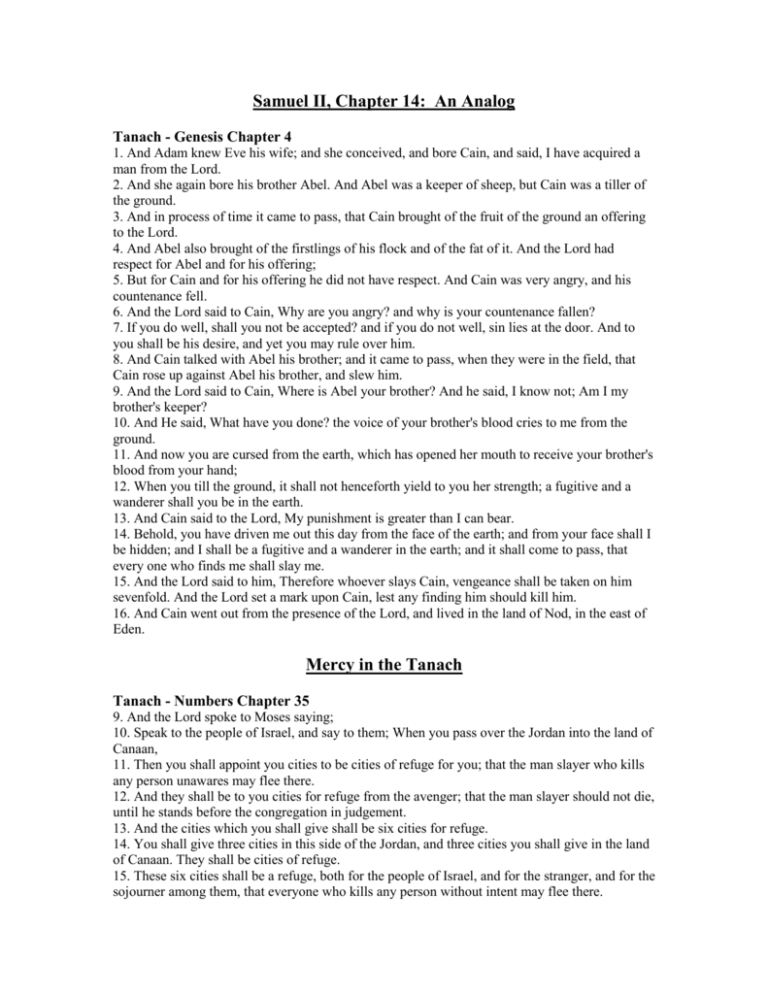
Samuel II, Chapter 14: An Analog Tanach - Genesis Chapter 4 1. And Adam knew Eve his wife; and she conceived, and bore Cain, and said, I have acquired a man from the Lord. 2. And she again bore his brother Abel. And Abel was a keeper of sheep, but Cain was a tiller of the ground. 3. And in process of time it came to pass, that Cain brought of the fruit of the ground an offering to the Lord. 4. And Abel also brought of the firstlings of his flock and of the fat of it. And the Lord had respect for Abel and for his offering; 5. But for Cain and for his offering he did not have respect. And Cain was very angry, and his countenance fell. 6. And the Lord said to Cain, Why are you angry? and why is your countenance fallen? 7. If you do well, shall you not be accepted? and if you do not well, sin lies at the door. And to you shall be his desire, and yet you may rule over him. 8. And Cain talked with Abel his brother; and it came to pass, when they were in the field, that Cain rose up against Abel his brother, and slew him. 9. And the Lord said to Cain, Where is Abel your brother? And he said, I know not; Am I my brother's keeper? 10. And He said, What have you done? the voice of your brother's blood cries to me from the ground. 11. And now you are cursed from the earth, which has opened her mouth to receive your brother's blood from your hand; 12. When you till the ground, it shall not henceforth yield to you her strength; a fugitive and a wanderer shall you be in the earth. 13. And Cain said to the Lord, My punishment is greater than I can bear. 14. Behold, you have driven me out this day from the face of the earth; and from your face shall I be hidden; and I shall be a fugitive and a wanderer in the earth; and it shall come to pass, that every one who finds me shall slay me. 15. And the Lord said to him, Therefore whoever slays Cain, vengeance shall be taken on him sevenfold. And the Lord set a mark upon Cain, lest any finding him should kill him. 16. And Cain went out from the presence of the Lord, and lived in the land of Nod, in the east of Eden. Mercy in the Tanach Tanach - Numbers Chapter 35 9. And the Lord spoke to Moses saying; 10. Speak to the people of Israel, and say to them; When you pass over the Jordan into the land of Canaan, 11. Then you shall appoint you cities to be cities of refuge for you; that the man slayer who kills any person unawares may flee there. 12. And they shall be to you cities for refuge from the avenger; that the man slayer should not die, until he stands before the congregation in judgement. 13. And the cities which you shall give shall be six cities for refuge. 14. You shall give three cities in this side of the Jordan, and three cities you shall give in the land of Canaan. They shall be cities of refuge. 15. These six cities shall be a refuge, both for the people of Israel, and for the stranger, and for the sojourner among them, that everyone who kills any person without intent may flee there. The Death Penalty in Judaism Talmud - Mas. Makkoth 7a ...A SANHEDRIN THAT EFFECTS AN EXECUTION ONCE IN SEVEN YEARS, IS BRANDED A DESTRUCTIVE TRIBUNAL; R. ELIEZER B. AZARIAH SAYS: ONCE IN SEVENTY YEARS. R. TARFON AND R. AKIBA SAY: WERE WE MEMBERS OF A SANHEDRIN, NO PERSON WOULD EVER BE PUT TO DEATH. [THEREUPON] RABBAN SIMEON B. GAMALIEL REMARKED, [YEA] AND THEY WOULD ALSO MULTIPLY SHEDDERS OF BLOOD IN ISRAEL! Stringencies of Evidence in Capital Cases Two witnesses were required. Acceptability was limited to: o Adult Jewish men who were known to keep the commandments, knew the written and oral law, and had legitimate professions; o The witnesses had to see each other at the time of the sin; o The witnesses had to be able to speak clearly, without any speech impediment or hearing deficit (to ensure that the warning and the response were done); o The witnesses could not be related to each other or to the accused. The witnesses had to see each other, and both of them had to give a warning (hatra'ah) to the person that the sin they were about to commit was a capital offense; This warning had to be delivered within seconds of the performance of the sin (in the time it took to say, "Peace unto you, my Rabbi and my Master"); In the same amount of time, the person about to sin had to: o Respond that s/he was familiar with the punishment, but they were going to sin anyway; AND o Begin to commit the sin/crime; The Beth Din had to examine each witness separately; and if even one point of their evidence was contradictory - even if a very minor point, such as eye color the evidence was considered contradictory and the evidence was not heeded; The Beth Din had to consist of minimally 23 judges; The majority could not be a simple majority - the split verdict that would allow conviction had to be at least 13 to 11 in favor of conviction; If the Beth Din arrived at a unanimous verdict of guilty, the person was let go the idea being that if no judge could find anything exculpatory about the accused, there was something wrong with the court. The witnesses were appointed by the court to be the executioners.


